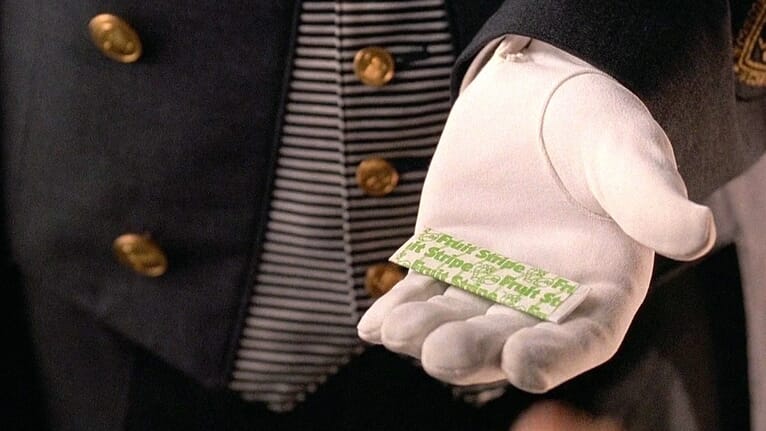What is cashless tipping?
Why did the scarecrow earn so many tips? Because he was outstanding in his field!
Cashless tipping
A tip (or gratuity) is a discretionary sum of money customarily given to certain service sector workers in addition to the basic price of the service. Tipping is practiced in many cultures, not least in Canada. Traditionally tips have been paid in cash, for example by leaving cash alongside the receipt in a restaurant, or leaving cash in a hotel room for the housekeeping staff.

Cashless tipping in its simplest form is the payment of such gratuities without using cash but instead by using electronic payment methods (not chewing gum as in Home Alone 2!). Most commonly we encounter cashless tipping in restaurants, bars and coffee shops where we are pressured into paying a tip when making a purchase using a credit card.

Kevin McCallister's take on cashless tipping in the '90s
Cashless tipping now comes in two flavours:
- The conventional demand to add a tip when you're paying for something with a credit card.
- The newer (and we think better) platform based approach exemplified by tippl.
In this post we're going to discuss the two flavours interchangeably. If you're interested to know about the advantages of the platform based approach specifically, then read our articles on how to improve the customer tipping experience, split tips, and how businesses can save on gratuity transaction fees.
The move away from cash
Whilst cash is still used on a regular basis, it is well documented that cash use has been in decline over the long term. For example, the Bank of Canada Methods-of-Payment survey (don't worry, we read it, so you don't have to) reported that cash was used for just 1 in 5 payments in 2023. Some of the people surveyed, albeit only a small minority, even said that they simply don't use cash at all. I count myself as one of those people, that is unless using a quarter for a swimming pool locker counts as using cash.
Given the decline in cash use, cashless tipping is finding a role in more and more places. Situations where people used to leave cash tips but can now instead make electronic payments include tipping hotel housekeepers and bellman, tipping coach drivers, and tipping food delivery people. Cashless tipping encompasses all of these scenarios and more, and there are a variety of ways to enable people to make tip payments electronically.
The humble tip jar is being supplemented, if not replaced, by electronic payments.
Is cashless tipping better than leaving cash?
Cashless tipping isn't necessarily better or worse, it's just a different means of achieving the same result.

In some situations, cashless tipping has the clear advantage of convenience. When was the last time you paid a cash tip in a restaurant or bar? The chances are that instead of leaving cash you simply pressed a button, added the tip to the bill, and made a single transaction. In such situations cashless tipping has almost entirely supplanted cash based tipping simply because of the convenience. Not to mention it alleviates the worry that some scoundrel will pilfer the cash off the table before the waitress even gets to it!
In other situations (think tipping a housekeeper in a hotel, or a ski guide on a mountain) cash-based tipping is probably the most convenient way to pay a tip, but it is undoubtedly in decline. If you don't have cash to hand, then it is in situations like these that cashless tipping, and especially platforms like tippl, come into their own:
- Tips can be paid to people who don't have credit card machines.
- Tips can be paid after the fact. Have you ever reflected on a great day out and then thought
I really should have tipped...
? - Unlike an e-Transfer, the recipient need not disclose their personal email or phone number.
Cashless tips can be paid using a mobile phone and more people carry phones now than they do cash.
Why should you care?
The answer to this question really depends on your perspective. We'll consider the three main perspectives: customer, employee, and employer.
Customer perspective
For customers cashless is obviously convenient. Beyond that, it's important to make a distinction between tipping with the much-derided card machine, and a cashless tipping platform. The latter can actually improve the customer experience. We explore how to improve the customer experience in more detail in a separate blog post.
Employee perspective
You can earn more money. There's really not a lot more to say about this – people generally go to work to earn money. Earning tips increases take-home pay, and if you work in an industry where cash tips used to be common you've probably noticed a decline in the amount of tips that you earn as your customers have moved away from using cash. We know from our own experience as paying customers that there are many instances where in the past we would have paid tips, but we don't any more as not carrying cash means we simply can't even though we may want to.
Employer perspective
Save money. You can save money as you don't have to pay the transaction fees for the gratuities. You could save even more if you arrange things such that you don't need to make EI or CPP contributions on gratuities.
Attract top talent. We live in a competitive world, with a hyper-competitive job market and evolving employee expectations. The most talented employees might have a range of jobs to choose from, and any number of priorities. Why should they pick you?
Attracting and retaining top talent goes beyond competitive salaries, but it sure is an important part of the mix! Earning cashless tips (in addition to traditional cash tips) increases your employees' take-home pay. If you're in an industry where your staff can't easily accept payments (housekeepers, ski instructors, ...) this could set you apart from your competitors and help you to attract the best people.
Employee retention. Employee retention can be defined as an organization's ability to keep its employees. No matter the economic climate, employee retention is critical to the success of your organization.
High levels of retention can save you money, foster better relationships, lead to better team member performance, generate more revenue, and make your company a more enjoyable place to work overall. This is important, particularly for small and medium-sized businesses where the costs of hiring and training staff can significantly impact the bottom line. No matter how high or low your turnover rate is, you can prevent top talent from leaving with the right practices and strategies.
There are many facets to effective recruitment and employee retention strategies - both of these are large subjects in their own right. In any case, competitive earnings and job perks are key ingredients when it comes to both recruitment and retention of the best staff. This is where enabling your staff to earn cashless tips can help your business.
Conclusion
Cashless tipping, especially with a platform such as tippl, offers many advantages over paying tips with cash or at point-of-sale. For more information see our how it works page or check out our blog for more insights.

Last updated August 8, 2024
Adam is an engineer who enjoys a good adventure, and lately he has started to become an expert in all things tipping. After a series of separate adventures with great guides where he found it difficult to pay a tip he decided to create tippl.
